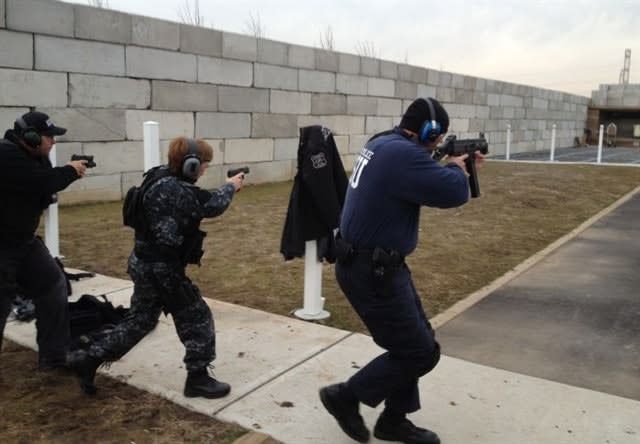At the Columbine High massacre, officers arrived and, perhaps realizing the firepower being used was too much, called out the SWAT team. It took more than 40 minutes for actual teams to arrive on the scene. In the meantime, some victims bled out due to the lag in response. Suddenly, the tactics "had to change."
In today's world, entire departments train in active shooter response operations. It has become simple common sense for departments to get their people trained in "advanced tactics" training for these types of response.
The North Hollywood bank robbery and shootout in 1997 stemmed the call for agencies to bring in long weapons such as AR-15/M-4 style rifles to combat such serious situations. Yet in many departments around the country, much of the training was spent familiarizing the officers with how to use the rifles efficiently. We had lots of good range time, trigger work, and good solid fundamentals. So why aren't these same officers trained in a basic SWAT component?
SWAT is a life-saving resource. Therefore, the tactics used are more explosive in nature; appear to be more fearless in approach; and build confidence in every field officer. Let's face it. The majority of SWAT teams in the nation are part-time teams. Very few full-time teams exist.
On these teams, many of the SWAT officers are strategically placed on different patrol and support division shifts as part of their work assignments. On any given day, in a mid-level town, you can have 12 to 20 officers responding to a scene within minutes. Many of these street officers link up with the SWAT officer on duty to gain the next rapid response move. The SWAT officer often takes control, stacks his team, and makes entry.
Here's where the problem lies.
We watch many operators in basic SWAT school. Some of the things we watch include movement with weapons, pivots, transitions to handgun and back to long weapon, backing out, and simulated entry work. These are the same skills street officers need to know.
Before Columbine, if non-SWAT-trained officers arrived on scene, entered the building, and made their way deep into the school looking for the bad guy(s), would they suddenly leave the building if a SWAT team linked up with them or would the SWAT team want the extra personnel?
My point? Basic SWAT gives just that—the basic tactics that too many veterans working today may look at as advanced. Shouldn't every good basic cop have the ability to quickly stack, flow into a room, hold a position if a SWAT team leader stated, "you two post this hallway," and back-clear or secondary search several rooms?
Lets face it. Tactical superiority, if not performed on a regular basis, is a diminishing skill. The same thing goes for basic firearms training.
I tell many students, "You clear rooms every day when you walk into shops and coffee houses or performing security checks of buildings. Do you take that eyeball view of the surroundings as the "norm"? If you're like me, you take a quick moment to "scenario the environment" and plan a response.
SWAT teams are a very advanced and elite group of individuals, especially when built around tough standards. Front-line response officers should not worry about the advanced tactics such as sniper work, camera poles, gas mask CQB situations, strategic hostage situations, and other extreme situations.
SWAT rules of entry hasn't become trade secrets, and it helps to have the extra operators I call "boots on the ground street warriors" rolling next to us when needed. Like us, they have limited fear, superior confidence and tactical unity with the common goal of saving and protecting life. That comes from knowing tactical basics.
Officer Jose Medina is an active member of the Piscataway (N.J.) Police Department's SWAT team. He is a professional trainer for Team APC training.













